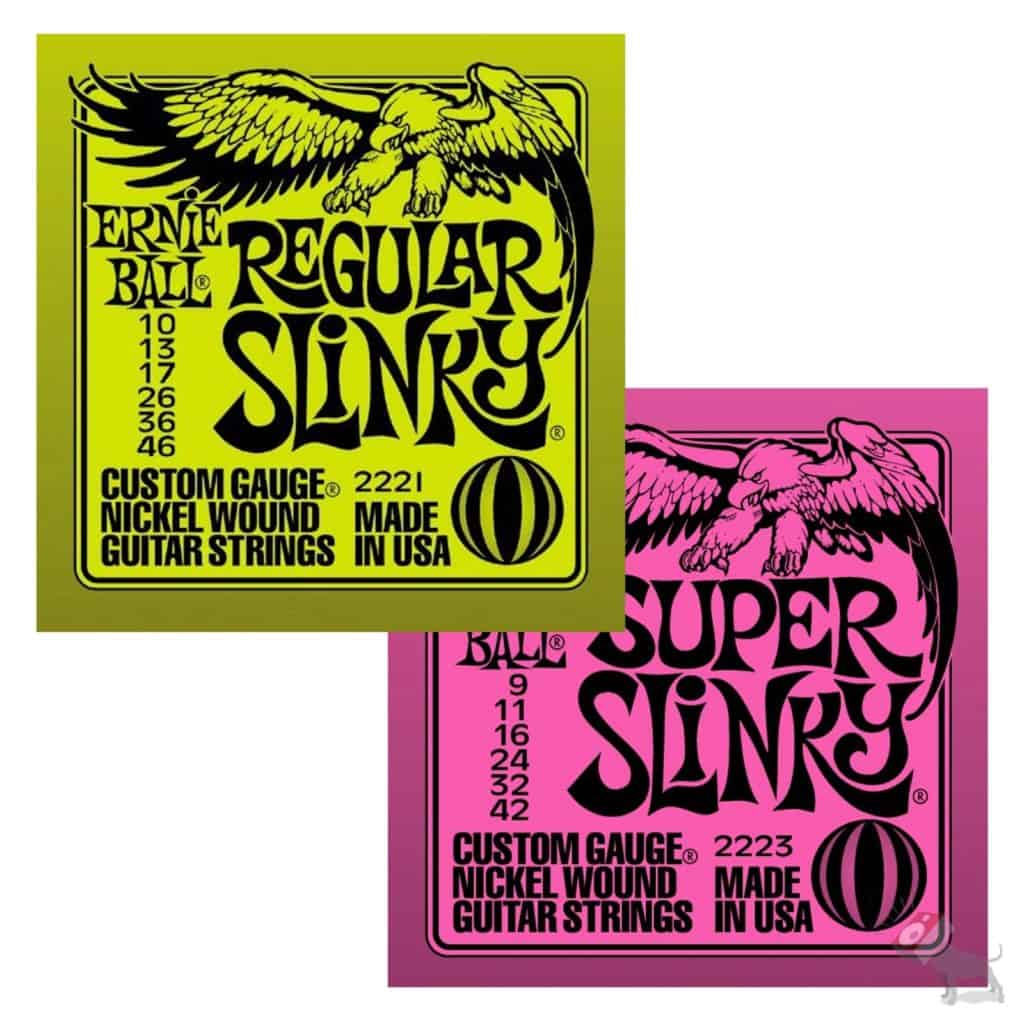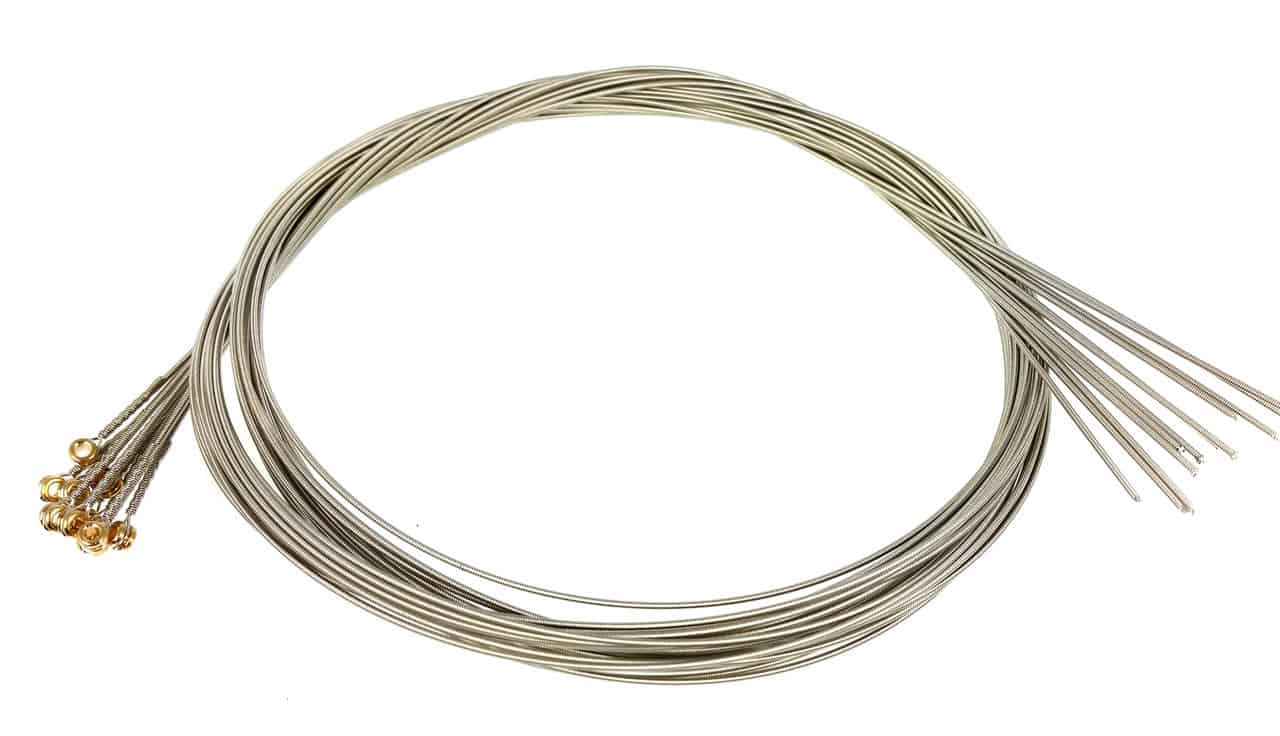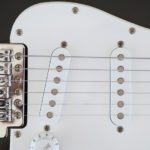We all have been there. The age-old question: Should I go for thicker strings in the search for tone or should I stay in the comfort zone with thinner ones?
First of all, there’s no shame in using .09s or even thinner strings. Every player is built differently and should pursue what makes them more comfortable.
Let’s be honest, 99.9% of us are here just for fun. Why risk getting tendinitis then?
And yes, that’s a possibility with thicker strings. But we’re not here to demonize them either.
It’s also perfectly fine if you prefer .10s.
What we will discuss in this article is what are the actual differences, where does each of these string set gauges shine and where do they fall short.
If you want a short answer about this topic, here it is:
The main differences between .09 and .10 guitar strings are that .09s have more low end and mids, while .10s are more scooped. .09s are easier to bend, while .10s are stiffer. Thinner strings might be more comfortable for many players, but thicker strings improve intonation, last longer, and reduce fret buzz.
If you want to stick with us for a bit longer, in this article we will dive deep into the differences between .09 and .10 string sets.
We will talk about tone, playability, durability, necks scale, different tunings, among many other important factors.
Finally, we will give you our insights into what we think might be the better string gauge for you.
At the end of this post, you will be better informed about what each of these string gauges brings to the table.
Are you ready to get started?
Let’s go!
Is there a sound difference between .09 strings and .10 strings?
There are actually, subtle, but noticeable differences in tone between .09 and .10 strings.
Rick Beato has a very informative video about this topic, you can see it down below:
But this shouldn’t come as a shock. It’s logical that there should be physical differences between materials of dissimilar thicknesses.
What is not that obvious is in what form or sound will this variation in response to the plucking resolve when playing the guitar.
What my ears tell me is that .09s sound a bit richer in mids and lows than the .10s and that could easily be a result of just how more massive strings vibrate differently.
Another important thing to keep in mind is that you will play differently, at least until you get used to the feel when you shift between string gauges.
Differences in playstyle, although as little as they might be, will surely influence the sound as much as the actual variation in string gauge.
It’s impossible to design a perfect experiment to listen for just the difference in string thickness when the player is a human. They will react to the difference in feel and affect the tone unconsciously.
To sum up this section: There are differences in sound, but they might be the interaction between the actual physical contrast in thickness, that affects string tension and stiffness, with the reaction of the player to the change in gauge.
Are there playability differences between .09 strings and .10 strings?
There surely are playability differences between string gauges. They just don’t feel the same, and every player will try to compensate for what they feel different, depending on where they are switching from.
If you switch from .10s to .09s you will, probably, feel that you’re overpowering your attacks on every note. You might gradually develop a softer touch to achieve the same result you achieved with thicker strings.
If your shift goes upwards in gauge, you most likely will experience the opposite phenomenon. Little by little you might be increasing the intensity of your playing to make the strings move as the .09s did.
That’s all a matter of what you are used to. Every player has a different touch.
What’s also a fact to note is that with thicker strings you will feel an increase in tension because they are more massive and they require more force to be applied to them to make them reach a certain tuning.
Bends will be harder to achieve, and you might develop a narrower vibrato. At least until you notice it and start working on it.
On the other hand, if you move to .09s, you might have the tendency to overshoot bends, ending up in sharper notes, and getting a wider vibrato.
None of these things is actually a problem and, as I said earlier, it all depends on the player.
In my particular case, I’m a short guy with small hands. I don’t have the leverage to bend a tone and a half comfortably in .10s. I can pull it off, but it’s easier for me to just stick with .09s. I don’t like fighting the strings.
Neck scale and string tension for .09 and .10 strings

Longer neck scales will increase string tension. That’s because of the physics of the instrument. Longer strings (the result of a longer neck) have to be at higher tension to have an equivalent pitch.
To make things simpler: A certain string gauge will have more tension in a Fender guitar than in a Gibson guitar since Gibson uses shorter neck scales.
Could you be more comfortable using .09s in Fender-like neck scales and .10s in Gibson neck scales? Probably.
The consensus among players is that the situation I laid out in the last sentence might feel about the same in terms of tensions and string stiffness.
You should always take into account the length of the string when deciding on which gauge you will set up your instrument with.
Will .10 strings last longer than .09?
A noted advantage of .10 strings over .09s is that they tend to last longer and be overall more durable when talking about the same quality and brand.
This might or might not be important to you, but if you do break strings often, and if you’re sure that it isn’t a problem with your guitar’s nut or bridge, going up in gauge might avoid you some headaches.
Are .09 strings cheaper?
.09 strings are not cheaper than .10 strings when looking at the same brands and quality levels.
This might be counter-intuitive, but as an economist, I can assure you that costs don’t define prices. It’s all a matter of supply and demand.
Going a step further, if you insist on a cost-driving-prices fantasy, the price of the extra material required for making a .10 string is surely negligible, and the costs of the rest of the production process are surely the same.
Ernie Ball Super Slinky vs Regular Slinky

I always thought that the Super Slinky sets and the Regular Slinky sets were of different quality or material or something.
I was wrong.
The only difference between Ernie Ball Super Slinky sets and Regular Slinky sets is that the former contain .09 gauge strings and the latter .10s.
The Slinky denomination is further altered with adjectives as you go up or down in string thickness.
Do .10 guitar strings sound better?
.10 guitar strings don’t necessarily sound better. They do sound different. The increased mass and tension results in a different reaction to the player’s attack. .10 string sets tend to have a tone with fewer mids and lows compared with thinner strings.
If that sounds better to you is just a matter of preference. Take into account, that the difference in feel might also be a big influence when deciding what is superior.
Do .10 guitar strings reduce fret buzz?
Thicker strings like .10s compared to .09s will probably reduce fret buzz. This is because a more massive string will sit higher in the nut resulting in less possible contact with the frets leaving all other variables the same.
Be careful, though, because if the higher gauge string doesn’t get to sit and make full contact with the bottom of the nut slot you might end up having tuning issues because the string will move loosely into this socket every time you bend or do vibrato.
Do .10 guitar strings have better intonation?

Thicker strings like .10s compared to .09s will have better intonation because they are stiffer and have higher tension. They’re less prone to bend when pressed against the fretboard vertically. This will be noted especially in guitars with higher frets.
If you are a player with a strong grip, you might suffer from intonation problems, particularly when playing chords if you use thinner strings.
Are .10 strings better for metal or lower tunings?
The reason why many metal players choose thicker strings like .10s or higher is that when playing with lower tunings, these gauges compensate for the reduced string tension, improving feel and decreasing the chances of fret buzz. Also, thicker strings tend to have less low end, making for a clearer tone.
Can I play metal or lower tunings with .09 strings?
Of course, you can play metal or dive into lower tunings with .09 strings. You might, however, start suffering from fret buzz if you go too low, and the feel of a lower tension could not be comfortable for your playing.
There are no rules set in stone, and you should do whatever you feel better. Give it a try, there’s nothing to lose.
Will .10 strings improve my playing over time?
This is another age-old question that might plague the minds of many beginners.
Have you ever watched an anime, a cartoon, or a movie where the main character trains with exaggerated added weights to then lose them for the final showdown?
Practicing with thicker strings might be the same for you, to a certain degree.
Thicker strings, like .10s, will help you build finger strength and stamina in your fretting hand. If you then switch to a thinner gauge, it will feel effortless. However, this sensation will not last forever. Like going to the gym, the muscles gained will atrophy over time if you stick with lighter strings.
What are hybrid guitar strings?

Hybrid guitar string sets like Ernie Ball’s Hybrid Slinky combine the best of both worlds. Usually, they come with the 3 lower strings in gauges corresponding to a .10 set, and the 3 higher consistent with a .09 set.
This combination is great for those who, for instance, go for a drop D tuning, and need that extra tension on the lower strings, but are more comfortable bending .09 higher strings.
The tone will surely be another interesting factor of these sets, as I said earlier, thicker strings tend to have less low end and mids, something that should help get a better-defined tone on the low pitched strings. Thinner strings have more lows and mids, which will surely give more body to the higher strings.
Should you use .09 strings or .10 strings?
Here in GearAficionado, we don’t like making choices such as this for you. Something like string gauge is a very personal matter that you should decide on your own.
What we strive to offer you is the most objective information to help you arrive at a better-researched conclusion.
We always encourage you to try out these kinds of things by yourself.
If it is within your possibilities and your patience, you should get sets of both these gauges and try them on your guitar back to back. This will surely be an experiences orders of magnitude more informative than reading an article or watching a YouTube video.
However, if you want to know what my insights are on the matter, here they are:
- If you have smaller hands, try .09 strings
- If you have strong muscular hands, .10s might be for you
- If you play rock, blues, or lighter styles, .09s might sound right for you
- If you play metal, go for .10s
- If you have trouble bending or want a wider vibrato, go down to .09s
- If you just want more durable strings, go up to .10s
- If your Fender-scale guitar’s strings are just too stiff, put some .09s on it
- If you want to build up strength and stamina on your fingers, get a set of .10s

Hello there, my name is Ramiro and I’ve been playing guitar for almost 20 years. I’m obsessed with everything gear-related and I thought it might be worth sharing it. From guitars, pedals, amps, and synths to studio gear and production tips, I hope you find what I post here useful, and I’ll try my best to keep it entertaining also.





